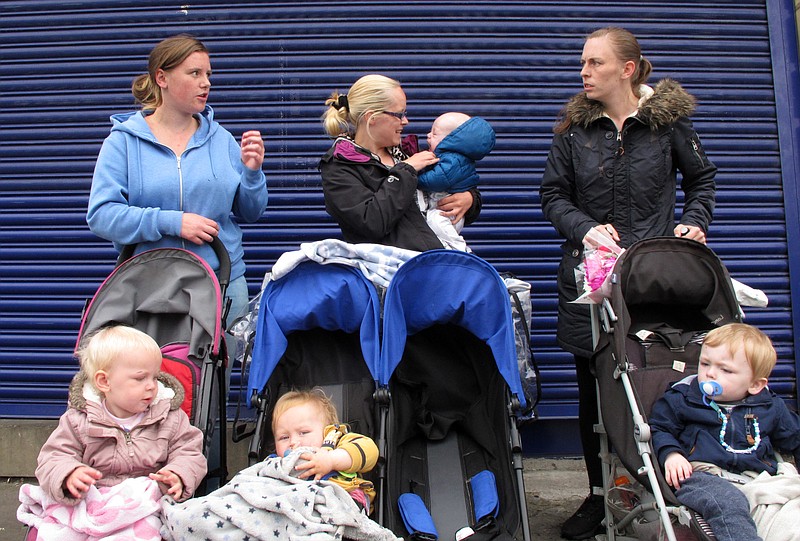BIRSTALL, England (AP) - Frozen in time, Jo Cox's website advises the public in her native West Yorkshire to meet her and discuss how she might help them with daily problems. "No appointment is necessary, please just come along," the message says.
The advice with dates, times and locations remains unaltered two days after a man armed with a hunting knife and handgun ambushed and killed Cox as she arrived, almost to the minute advertised, beside Birstall's bustling street market.
Many of Cox's colleagues in the 650-member House of Commons now openly wonder whether Britain's unusual tradition of constituency "surgeries," as the weekly face-to-face meetings are known, can survive in an increasingly uncivil age.
"Parliament needs to look very carefully at how it protects its MPs in their constituencies in a world that has changed," said Charlotte Leslie, a lawmaker in the ruling Conservative Party who had hate messages spray-painted on her car last year. "Social media has had a very dramatic impact on people who are isolated and lonely. ... My colleagues and I have noticed a rise in hatred born out of social media."
Britain's politicians broadly say they cherish the ability to make personal contact with voters and help them find solutions to problems with government-funded services, litter, traffic problems or community crime. Yet even before Cox's slaying Thursday, she and many others had complained they felt vulnerable when away from the heavily guarded Parliament in London.
Anna Turley, like Cox a lawmaker elected last year for the opposition Labour Party, said the only security measure she has been provided when pressing the flesh in her North Yorkshire district is a police-summoning alarm on her keychain. She said lawmakers needed security present "if something starts to go wrong." Turley said she and Cox had regularly discussed "the increasing nature of hostility and aggression, particularly toward female MPs, particularly on social media."
On Saturday, at the bouquet-filled memorial to Cox in Birstall's market square, ashen-faced locals described the moment when they heard Cox had died, the last time they saw her - and how she had helped their families.
"I wish I could thank Jo, but it's too late now," said Jodie Britton, who laid a bouquet on behalf of herself and her father, a hospital union representative whom Cox had supported on a recent picket line.
Both Britton and her friend, Jessica Clarkson, had come to pay respects to Cox after both received help from the lawmaker in fixing problems with their state-provided homes. In Britton's case, her two children were suffering breathing problems because of a leaky roof and moldy, damp walls. Months of complaints to the local council had achieved nothing.
Two days after appealing to Jo's office, Britton said, "the council called me to sort the repairs."
"Jo were amazing. She got it sorted and both of my children are fine now," Britton said, employing the Yorkshire dialect, which prefers the plural "were."
Britton and Clarkson said they doubted whether West Yorkshire's next parliamentarian would be nearly so available, because stronger security was needed. They said the attack on Cox showed that unprotected politicians could be magnets for extremists.
"If I was coming out from the surgery, it could have been my kids who got shot," said Clarkson as she cradled her youngest child, 20-week-old Lochlon, and rocked a stroller bearing her 16-month-old son, Jamson. "Local MPs need protection just like (Prime Minister) David Cameron."
Long before Thursday's killing, evidence had mounted of lawmakers' unease with an often-hostile public.
Britain's Journal of Forensic Psychiatry and Psychology in January published a study of lawmakers' experiences and found that 82 percent had experienced threats or attacks. Half had been targeted in their own homes, and 15 percent expressed fears of going out in public without protection.
The national mood has grown particularly edgy in the run-up to Britain's referendum Thursday on whether to remain in the European Union. Left-wing lawmakers like Cox, who was outspoken in supporting immigrants' rights and staying in the EU, faced social media threats from British nationalists. She also fielded abuse from the other extreme after arguing in favor of extending British air strikes against Islamic State militants. Police tracked down one man responsible for sending her menacing messages and gave him a criminal caution.
Diane Abbott, a Labour lawmaker from London, said Cox had "contacted police on several occasions over threats made to her before her murder." She said social media platforms had "turbocharged a culture of misogyny and violent threats."
Yet others have resisted calls to boost security at their offices and other spots where they meet voters.
"We don't sit behind glass screens when we talk to our constituents. We don't, with a handful of exceptions, go around in armored cars. We need to be out there," said former Labour deputy leader Harriet Harman. "So we need to create a climate where we can do our jobs without being under threat from a culture of venom."
"I don't think any of us want to put up barriers to people coming to see us," said Stephen Timms, another London lawmaker who has maintained open surgeries despite nearly being killed at one in 2010. A 21-year-old woman angered by Timms' past support for the 2003 invasion of Iraq stabbed him twice in the stomach with a 6-inch (15-centimeter) knife.
"After I was attacked, the question was put to me: Would you like a metal detector in your surgery?" Timms said. "The problem with doing this is it makes going to see your MP a grim experience. ... We want it to be a pleasant experience because these are the people who will be voting for us."
And as he laid his own bouquet at the Birstall memorial, fellow West Yorkshire lawmaker Barry Sheerman said Cox would never have sacrificed public surgeries to ironclad security.
"Jo would have hated it if we abandoned our commitment to open engagement with the public," Sheerman said. "She was so good at it."
